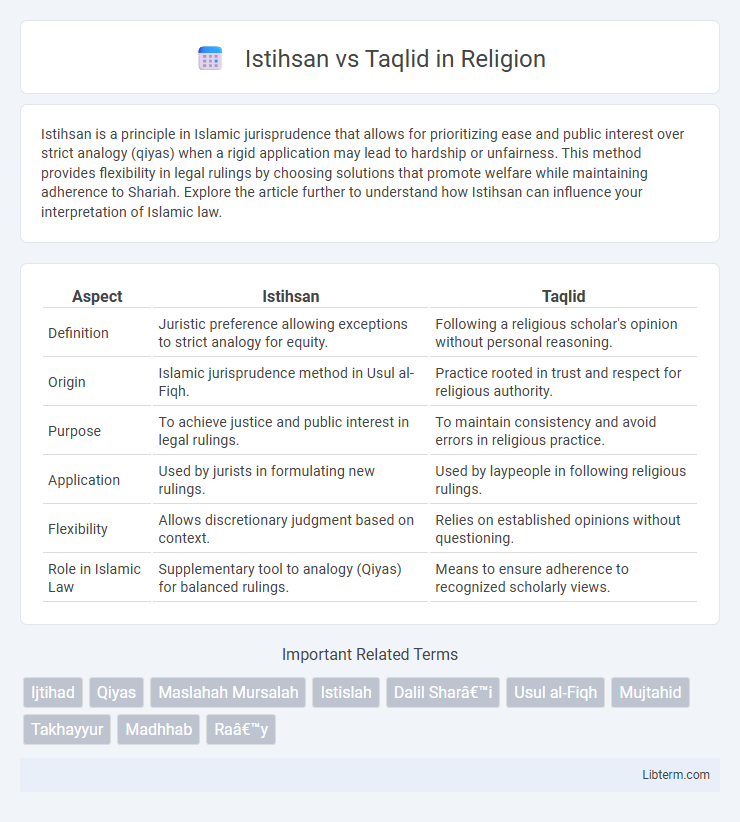Istihsan is a principle in Islamic jurisprudence that allows for prioritizing ease and public interest over strict analogy (qiyas) when a rigid application may lead to hardship or unfairness. This method provides flexibility in legal rulings by choosing solutions that promote welfare while maintaining adherence to Shariah. Explore the article further to understand how Istihsan can influence your interpretation of Islamic law.
Table of Comparison
| Aspect | Istihsan | Taqlid |
|---|---|---|
| Definition | Juristic preference allowing exceptions to strict analogy for equity. | Following a religious scholar's opinion without personal reasoning. |
| Origin | Islamic jurisprudence method in Usul al-Fiqh. | Practice rooted in trust and respect for religious authority. |
| Purpose | To achieve justice and public interest in legal rulings. | To maintain consistency and avoid errors in religious practice. |
| Application | Used by jurists in formulating new rulings. | Used by laypeople in following religious rulings. |
| Flexibility | Allows discretionary judgment based on context. | Relies on established opinions without questioning. |
| Role in Islamic Law | Supplementary tool to analogy (Qiyas) for balanced rulings. | Means to ensure adherence to recognized scholarly views. |
Understanding Istihsan: Definition and Origins
Istihsan, an Islamic jurisprudential principle meaning "juristic preference," allows scholars to depart from strict analogical reasoning (qiyas) to achieve more equitable outcomes based on public interest or fairness. Originating from early Islamic legal thought, Istihsan provides flexibility by prioritizing ease and justice, often rooted in the Hanafi school of law. This contrasts with Taqlid, which involves blind adherence to established legal opinions without independent reasoning.
Exploring Taqlid: Meaning and Historical Context
Taqlid refers to the practice of adhering to established Islamic legal rulings without demanding direct evidence or reasoning, ensuring continuity in religious observance. Historically, Taqlid emerged as a means for lay Muslims to follow qualified scholars' interpretations amid complex jurisprudential issues. This practice balances between preserving traditional legal frameworks and facilitating accessible guidance for the broader Muslim community.
Fundamental Differences Between Istihsan and Taqlid
Istihsan is an Islamic jurisprudential principle that allows jurists to depart from strict analogical reasoning (qiyas) to reach more equitable rulings based on public interest or fairness (maslahah). Taqlid, on the other hand, involves following established legal opinions or madhhab without independent reasoning (ijtihad), emphasizing adherence to traditional scholarship. The fundamental difference lies in Istihsan encouraging juristic discretion and contextual judgment, whereas Taqlid prioritizes conformity to authoritative precedent.
The Role of Reasoning in Istihsan
Istihsan, or juristic preference, allows Islamic scholars to apply reasoning and discretion to depart from strict analogical deductions when strict application leads to hardship or injustice. It emphasizes the use of rational judgment to achieve equitable solutions and reconcile conflicts within Shariah principles. Unlike Taqlid, which involves blind adherence to established legal opinions, Istihsan empowers scholars to reinterpret evidences based on public interest (maslahah) and contextual realities.
Authority and Tradition in Taqlid
Taqlid emphasizes adherence to established legal precedents and authoritative scholars, reinforcing the continuity of Islamic jurisprudence through tradition. It relies on the authority of past jurists to maintain consistency and prevent innovation outside recognized frameworks. This approach prioritizes the preservation of collective scholarly wisdom over individual reasoning, contrasting with Istihsan's preference for flexible, context-driven judgment.
Key Supporters and Critics of Istihsan
Istihsan, embraced by Hanafi scholars like Abu Hanifa, is supported for its flexibility in achieving equitable outcomes by allowing juristic preference over strict analogy. Critics such as Hanbalis reject Istihsan, arguing it undermines the consistency of qiyas (analogical reasoning) and deviates from clear scriptural evidence. The debate highlights Istihsan's role in balancing rigid juridical rules with pragmatic justice in Islamic jurisprudence.
The Evolution of Taqlid in Islamic Jurisprudence
Taqlid, originally a practice of following established legal opinions in Islamic jurisprudence, has evolved from strict adherence to classical scholars to a more nuanced approach accommodating contemporary contexts and diversified sources. Istihsan, or juristic preference, challenges rigid Taqlid by allowing flexibility for equitable solutions when strict analogy (Qiyas) leads to hardship or injustice. This evolution reflects a dynamic interaction between traditional authority and the need for adaptive reasoning in modern Islamic legal theory.
Practical Applications: Istihsan and Taqlid in Modern Life
Istihsan, an Islamic jurisprudential principle allowing for juristic preference to achieve fairness, offers flexibility in addressing contemporary legal and ethical issues, such as financial transactions and medical ethics. Taqlid, the adherence to established scholarly opinions, ensures consistency and reliability in religious rulings, particularly vital in daily worship, family law, and ritual practices. In modern life, the balance between Istihsan and Taqlid enables Muslims to navigate new challenges while maintaining fidelity to traditional Islamic law.
Comparative Analysis: Istihsan vs Taqlid in Shariah Law
Istihsan in Shariah law allows jurists to depart from strict analogy (qiyas) to achieve fairness and public interest, emphasizing reasoned discretion, while Taqlid involves following established legal opinions without questioning. Istihsan promotes adaptability and contextual judgments in Islamic jurisprudence, contrasting with Taqlid's reliance on authoritative legal precedent. This comparative analysis highlights Istihsan's role in dynamic legal interpretation versus Taqlid's preservation of doctrinal consistency.
Contemporary Perspectives and Ongoing Debates
Contemporary perspectives on Istihsan versus Taqlid highlight a dynamic tension between interpretative flexibility and adherence to established scholarship within Islamic jurisprudence. Istihsan, or juristic preference, allows scholars to deviate from strict analogical reasoning (qiyas) to achieve equitable outcomes, promoting adaptability in legal rulings. Debates continue as critics argue that excessive reliance on Istihsan may undermine doctrinal consistency, while proponents defend it as essential for contextualizing Sharia in modern societal challenges.
Istihsan Infographic

 libterm.com
libterm.com